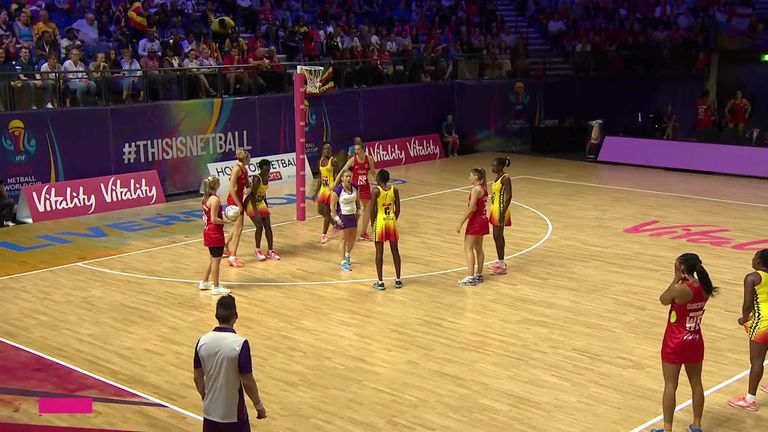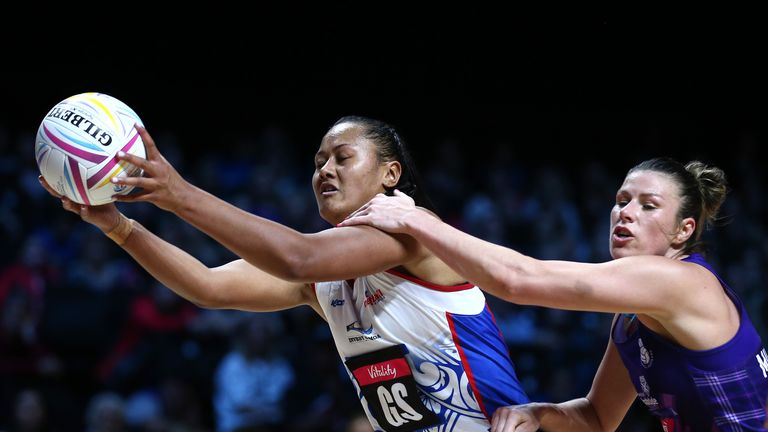With netball having a higher profile than ever before, the physicality of the sport is going to go up a notch as the title contenders go head-to-head – and it may force the sport to rethink it’s World Cup format.
As the first phase of the Netball World Cup reaches its conclusion, it’s the commentary of Sky Sports‘ Mikki Austin that underlines what every netballer knows: “Netball is non-contact? Whomever said that needs to turn on their TV and see what’s happening in the world game because it is wild.”
Interest in the sport is soaring, with packed arenas, expectant crowds and media coverage reaching new heights, but with it comes a wider audience that are starting to understand that there is more to netball than pivots, chest passes and avoiding contact.
Those who play, cover and have watched the sport know just how fierce it can be and the start of the tournament in Liverpool, has underlined the athleticism on display. The difference in styles of play has also brought the sport’s physicality under a new focus.
“England teams have always been taught not to send the ball long and across channels but the African and Caribbean nations are happy to play in a different way and sent the ball cross-court,” Austin tells Sky Sports.
“That catches teams out, Zimbabwe put 37 goals on Australia with that style, Northern Ireland couldn’t manage that.”
Whether it’s evenly matched teams and players contesting 50-50 ball or one of the lower ranked nations being just a split second slower than the elite bracket, the term body-on-body has never been more apt.
“When you say a non-contact sport, automatically that throws up an image in peoples’ minds of placid, separation and space and that just isn’t the reality of what you see and especially at this World Cup,” Austin adds.
“Some of the teams don’t get this standard of competition week in, week out – they might not even get it on a yearly basis, potentially the only time that they do is every two or four years when a major competition comes around.
“I think that it is really the speed of movement and the speed of the ball that really does catch some of these teams out.”
As Austin alludes to, standards are rising. Professionalism and preparation is too.
England have experienced it first hand, losing starting defender Layla Guscoth to a ruptured Achilles just a day after a hugely physical contest that saw Uganda suffer the first World Cup sending off most people can recall.
What a day. 8 games, 8 winning teams, a celebration of 100 caps for @Jarten, the first time I've seen a netball player sent off and the team continue with 6 players, an incredible crowd of supporters and many more things later. Day 1 is complete!! Roll on day 2 ???? #NWC2019
In the aftermath of their win over Samoa, Roses head coach Tracey Neville suggested that the tournament may need a rethink given the intensity and athleticism required on a daily basis
A demanding schedule of eight games in 10 days will test every nation, whether competing for gold or contesting in the placing matches later in the week
“International netball has moved on quite a lot, it was dominated by one or two teams when I was playing but we have a range of the top eight teams that can compete and push you to the limits,” said Neville.
- Roses ready to rise as England expects
- The secret to Diamonds dominance
“Maybe now the tournament needs to be looked at in terms of the physical capacities but it is what it is and we knew that coming into the tournament.”
Those that can are being more professional in their approach. The full-time Australian Super Netball competition made a late decision to allow teams the option to extend their squads from 12 to 14 players when they return for the rest of the domestic season just a week after the World Cup conclusion.
The Diamonds head coach Lisa Alexander backed up Neville’s thoughts on the intensity of the tournament and having seen the sport explode in terms of it’s elite level athletes is in no doubt that a rethink is needed.
“Having the back-to-back schedule, not being able to replace injured players, that is a real downer for our sport,” she said.
“It’s not just the physicality, the athletes are now so highly trained and extraordinarily fit that having to do that level day-in, day-out is going to take it’s toll.
“I have always coached tournaments and part of the charm has always been planning the week accordingly but we are getting into such high territory with the athletes being so fit and so intense that we need to be mindful.
“Particularly the back to back nature, a few more days off would make a big difference.”
Just what is contact and how it’s interpreted is increasingly up for debate, and it is something that needs to be addressed according to Tamsin Greenway.
A sharp burst of the whistle and the stern voice of an umpire’s ‘contact wing defence’ is the bane of many a netballers’ life but also the reason for much bafflement from those that are new to the sport
“In simplistic terms contact is when you encroach on the player. You can go 50-50 for a ball, absolutely fine but if you hit the player before or after without getting the ball that will be deemed contact,” the former England captain tells Sky Sports.
Some are relishing the battle, Scotland captain Claire Maxwell has been enjoying the nature of the contests.
Greenway believes that England’s series against Uganda in November was crucial in getting ready for the styles that they have, and will, face. The Roses coped with the She-Cranes’ physicality better that during a three-match struggle at the end of last year.
“It’s heightened when you get to a World Cup, you have a mixture of countries all playing different styles and some are going to clash more than others,” Greenway told Sky Sports.
“You may have a Caribbean side, with an African umpire taking on Australia so everyone is having to constantly adapt.
“The bigger questions for me are coming around the contest and how that word is thrown around. We like the idea that is not a non-contact sport, we get that now but that means contest has become a major talking point.”
As with any sport, netball’s value to the fans in the arenas and watching on TV, is paramount and the game now has a growing global audience.
The dedicated fan has been joined by the casual observer and Greenway adds that there is a duty to showcase the very best the sport has to offer. The former England Rose also bristles at the notion that teams should be given leeway, saying the players and the umpires have to take responsibility.
“Where do you draw the line in what is contested ball and what is contact? It’s easy to throw the word contest around but what are we happy with that brings depth to the game,” says Greenway.
“It wasn’t long ago England were getting blown out by Australia and New Zealand. I have played against some of these players, I know what goes on out there.
“It is more and more the stuff that is happening away from the ball, and all the teams have that responsibility.
“There is stuff that crosses the line and it happens all over, some players and coaches do it naturally and some won’t – there is a bigger picture and if we are going to put on a spectacle everyone is going to have to adapt.”
After the first preliminary stage, the ferocity is likely to go up several notches with the big five nations set to go head-to-head. It started with Jamaica and South Africa on Sunday afternoon and there’ll be more to follow.
England will play both of those teams while Australia and New Zealand will also come face-to-face in the second phase. The results are likely to shape the semi-finals where the game will come under an even bigger microscope as the trophy looms into view and the stakes are raised
“We are going to see England vs Jamaica, Australia vs New Zealand – games where the contest is going to be in different places, you may not see the deliberate stuff as much but it will be going on.”
Source: Read Full Article



